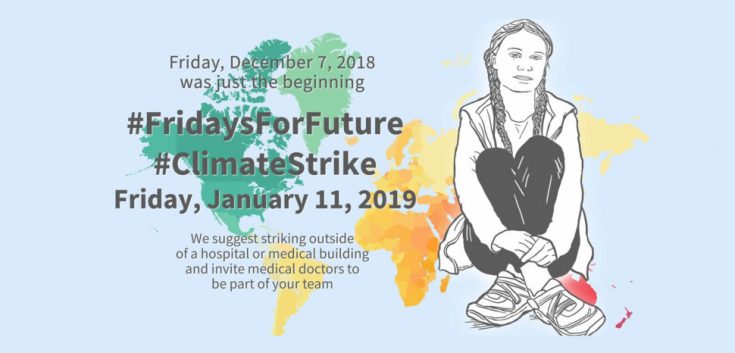
Image from: https://www.fridaysforfuture.org/
by Anna Hum
11 years. That’s the amount of time that we have left according to the United Nations International Panel on Climate Change (IPCC) before our Earth has warmed so much that our everyday lives will be plagued with dire circumstances – extreme heat waves, droughts, floods, and other climactic extremes.
Labeled as a crisis and as catastrophic, the IPCC’s report is once again putting climate change at the forefront of our worries – as it should be. Painting an apocalyptic future, the special report on Global Warming of 1.5°C highlights the significant impacts of climate change: what has happened, and what will come if (and when) we reach the tipping points of 1.5°C and 2°C. With our continued inaction, it’s likely that nothing will go unaffected: the sea levels will continue to rise, our health will deteriorate, and it’s just risk after risk after risk.
So now what?
Maybe after hearing about the impending doomsday-esque future we have in store, or reading the report yourself, you’re now thinking something along the lines of “well, this really sucks, but what can I do?” Some have suggested that small individual-level actions, like avoiding meat and dairy or reducing your consumption of it, has the potential to make a huge difference. Or changing your commute and methods of transportation – drive less or carpool more often, and don’t travel on a plane. But the one action that may have the biggest impact, and debatably be the most significant thing that you can do? Demand for more (and better) political action to mitigate the effects of climate change.
If we’re going to be serious about tackling the climate crisis, it’s time for us to wake up and change. More importantly, our governments and the most powerful international bodies need to change the things that individuals can’t do on our own. But what happens when governments are “not mature enough to tell it like it is?” You strike. You protest. You make your voice heard. At least, that’s what 16-year-old climate activist Greta Thunberg is advocating for.
Too young to vote and frustrated with politicians being all talk and no game, in August 2018, Thunberg started walking out of school to protest outside of the Swedish parliament. What once started as a solo-mission from the Nobel Peace Prize nominee has since developed into a global movement to demand for better. Youth around the world have mobilized: they are walking out of their schools each Friday to demand that adults take more action. The global strikes are dubbed as #FridaysForFuture: protests for a livable planet, and a livable future.
By temporarily sacrificing their educations to participate in the climate strike, these students are encouraging adults to actually do something instead of leaving this massive burden on their children and the generations that will come after them. Who cares about a career when the planet you inhibit will be dead by the time you need to look for a job, right? They have a point.
They’re calling out the politicians that have sat back and failed them. They’re taking action into their own hands. They’re demanding for better: for cleaner energy, for fossil fuels to stay in the ground, for safe pathways to a sustainable future – and they have the momentum. But are you ready to listen to them? Are you ready to join them?